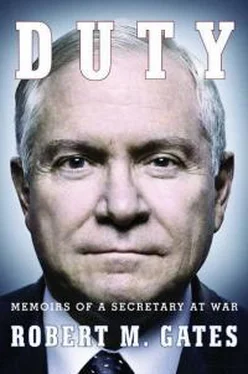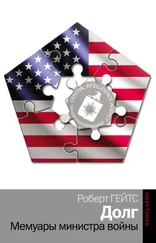Beyond the Defense and Veterans Affairs bureaucracies, there were two other obstacles to reforming the disability system for wounded warriors. The first was Congress, which has over the years micromanaged anything dealing with veterans and responds with Pavlovian reliability to lobbying by the veterans service organizations (VSOs, including the Veterans of Foreign Wars and the American Legion). Nearly any change of consequence requires new law—a huge challenge. In October 2008, I directed development of a “stand-alone” legislative proposal that would give us the authority to create an express lane for catastrophically and severely wounded warriors.
In December, Mullen and I met again with the people in Defense working on the wounded warrior problem to discuss what initiatives we might suggest to the new presidential administration. I said that I had reached out to the new veterans affairs secretary, Eric Shinseki, who was eager to work with us on the disability evaluation issue. There were two choices: either Defense and VA worked this problem out together or we would go the legislative route. Mullen noted that we needed to improve support for families of the wounded, and I responded that we needed legislative relief to reduce their financial burden. Finally, I said we needed to make sure the National Guard and Reserves were provided for in any legislation. We knew that the legislative path would be tough because of the veterans organizations.
I greatly admire the VSOs for their work on behalf of veterans, for their patriotic and educational endeavors, and for their extraordinary efforts to help military families. That said, again and again they were a major problem whenever I tried to do something to help those still on active duty—for example, my attempt to bring about the changes in the disability evaluation system as described above. The organizations were focused on doing everything possible to advantage veterans, so much so that those still on active duty seemed to be of secondary importance, especially if any new benefits or procedures might affect veterans. The best example of this was their opposition to legislation implementing some of the excellent recommendations of the Dole-Shalala commission. That was unforgivable.
Another example: Senator Jim Webb authored a new GI Bill that was immensely generous in its educational benefits for veterans. I felt the benefits were so generous they might significantly affect retention of those on active duty. I wanted Congress to require five years of service to qualify for the benefits so we could get at least two enlistments out of troops before they left the service. When I called House Speaker Pelosi to press for this change, she told me, “On matters such as this, we always defer to the VSOs.” (When I visited Fort Hood in the fall of 2007, a soldier’s wife suggested to me that a service member ought to be able to share his or her GI Bill education benefits with a spouse or children. I thought it was a great idea and suggested it to President Bush, who included it in his 2008 State of the Union Address. There was little enthusiasm for it on Capitol Hill, but we were able, ultimately, to get it included in the final GI Bill—a benefit I saw as somewhat offsetting our inability to require five years of service to qualify for the education benefit.)
I found it very difficult to get accurate (and credible) information from inside Defense about whether we were making progress in helping wounded warriors and their families. The bureaucrats in the personnel and readiness office would regularly tell me how well we were doing and how pleased our troops and families were. Meanwhile I was hearing the opposite directly from the wounded. I insisted that we get more comprehensive and accurate feedback from the wounded, other troops, spouses, and parents. “I want an independent evaluation of soldiers and families and a list of programs where you need money,” I said.
I would never succeed in cracking the obduracy and resistance to change of the department’s personnel and health care bureaucracy, both military and civilian. It was one of my biggest failures as secretary.
THE WAR ABOUT WAR
In the spring of 2008, the vital issue of the military services’ preoccupation with planning, equipping, and training for future major wars with other nation-states, while assigning lesser priority to current conflicts and all other forms of conflict, such as irregular or asymmetric war, came to a head. It went to the heart of every other fight with the Pentagon I have described. In my four and a half years as secretary, this was one of the few issues where I had to take on the chairman and the entire Joint Chiefs of Staff.
Their approach, it seemed to me, ignored the reality that virtually every American use of military force since Vietnam—with the sole exceptions of the Gulf War and the first weeks of the Iraq War—had involved unconventional conflicts against smaller states or nonstate entities, such as al Qaeda or Hizballah. The military’s approach seemed to be that if you train and equip to defeat big countries, you can defeat any lesser threat. I thought our lack of success in dealing with the Iraqi insurgency after 2003 disproved that notion. I didn’t disagree with the importance of preparing for war against other nations. While that kind of conflict was the least likely, it would have the most significant consequences if we were not prepared. However, I thought we also needed explicitly to budget, train, and equip for a wide range of other possible adversaries. It was never my purpose to relegate state-to-state conflicts and the sophisticated weapons to fight them to second-level status compared to the wars we were currently fighting, but rather to ensure that we maintained our nontraditional capabilities. I wanted them to have a place in the budget and in the Defense culture that they had never had.
In short, I sought to balance our capabilities. I wanted to institutionalize the lessons learned and capabilities developed in Iraq and Afghanistan. I didn’t want the Army, in particular, to forget how to do counterinsurgency—as it had done after Vietnam. I did not want us to forget how we had revolutionized special operations, counterterrorism, and counterinsurgency through an unprecedented fusion of intelligence and combat operations. I did not want us to forget that training and equipping the security forces of other nations, especially developing nations, might be an important means of avoiding deployment of our own forces. My fights with the Pentagon all through 2007 on MRAPs, ISR, wounded warriors, and more made me realize the extraordinary power of the conventional war DNA in the military services, and of the bureaucratic and political power of those in the military, industry, and Congress who wanted to retain the big procurement programs initiated during the Cold War, as well as the predominance of “big war” thinking.
As mandated by law in 1986, the president must produce a National Security Strategy, a document that describes the world as the president sees it and his goals and priorities in the conduct of foreign affairs and national security. The secretary of defense then prepares the National Defense Strategy, describing how Defense will support the president’s objectives through its programs. The NDS provides a framework for campaign and contingency planning, force development, and intelligence. Given finite resources, the NDS also addresses how Defense would assess, mitigate, and respond to risk, risk defined in terms of “the potential for damage to national security combined with the probability of occurrence and a measurement of the consequences should the underlying risk remain unaddressed.” Finally, drawing on the NDS, the chairman of the Joint Chiefs of Staff prepares his own document, the National Military Strategy, providing even more specific guidance to the military services and combatant commands in terms of achieving the president’s goals.
Читать дальше












